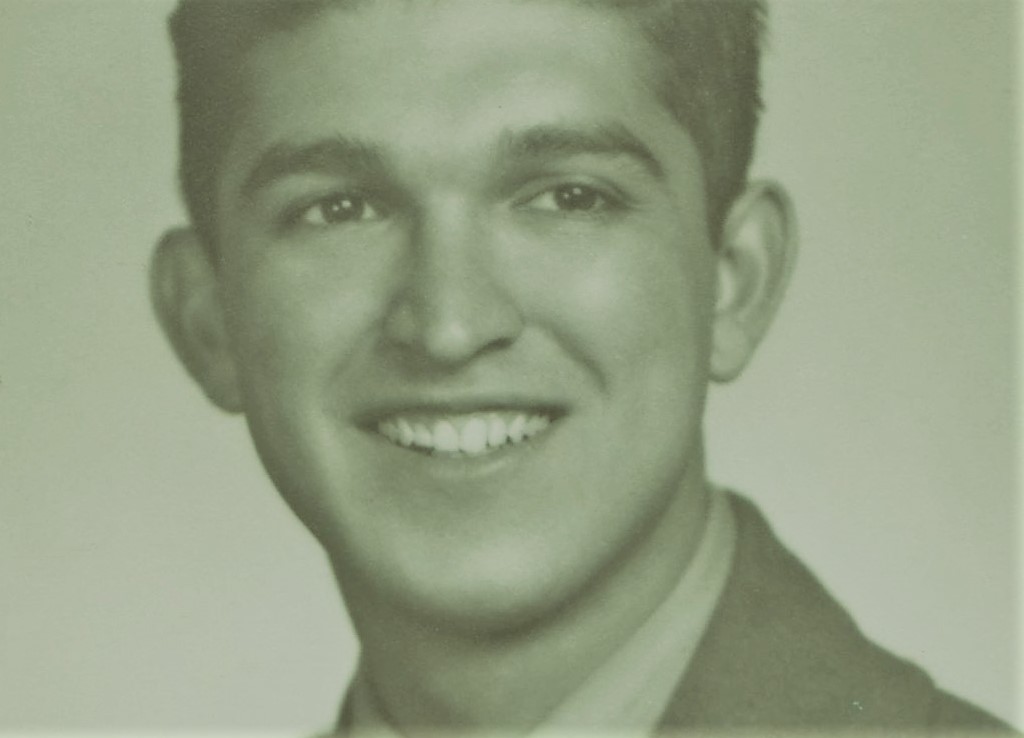
All of those men who liberated the camps throughout Europe never lost the memories of what they witnessed. Below are just some of their accounts.
The Dachau concentration camp was liberated on April 29, 1945. Hilbert Margol (pictured above) and his twin brother, Howard. Two Jewish American soldiers were there and documented the tragedy. Hilbert and Howard came across the so-called “death train” at Dachau. This is his recollection.
“So we get orders to pull off to the right side of the road. We all smelled this very distinct odour, a very strong odour. One of our jeep drivers came by and he said, ‘On the other side of those woods, it must be a chemical factory over there.’ Well, Howard heard that and he came over to me, and he said, “I don’t think it’s a chemical factory.” And he said, you know, that odour reminded him of when our mother used to go to the kosher meat market to buy a freshly killed chicken. She would take it home and hold it over the gas flame of the gas stove in the kitchen to burn off the pin feathers. It would burn the skin and some of the fat of the chicken. He said that’s the odour it reminds him of. I said, “Well, why don’t we go over there and see what is over there.” We were curious. The first thing we saw, we saw a line of railroad boxcars. Now we climbed over between two of the railroad cars and on the other side, some of the cars’ sliding doors had been opened by the infantry guys in front of us. That’s who we supported. And on that boxcar plus others on that train was [sic] dead bodies and most of them were in very grotesque positions. And, of course, it was easy to see they were all dead. US Army Infantryman Private Hilbert Margol 42nd Infantry Division 508.784.1945 Testimony 1”

A young African American GI, Leon Bass, entered the notorious Buchenwald concentration camp and saw piles of dead bodies and prisoners so weakened that large numbers of them would die in the days and weeks following the liberation. This encounter was seared into his memory.
Leon Bass entered the Buchenwald concentration camp in Germany as part of an intelligence reconnaissance unit. This is his recollection.
“We were in the intelligence reconnaissance section of our unit and we went right to Buchenwald. And that was the day that I was to discover what had been going on in Europe under the Nazis because I walked through the gates and I saw walking dead people. And just looking at these people who were skin and bone and dressed in those pyjama-type uniforms, their heads clean-shaven, and filled with sores through malnutrition. I just looked at this in amazement and I said to myself, you know, “My God, who are these people? What was their crime?” You know? It’s hard for me to try to understand why anyone could have been treated this way. I don’t care what they had done. And I didn’t have any way of thinking or putting a handle on it, no frame of reference. I was only 20. Had I been told, I doubt if I could have had, in my mind’s eye, envisioned anything as horrible as what I saw. Reconnaissance Sergeant Leon Bass 183rd Combat Engineer Battalion 508.784.1945”

During the winter of 1944-45, Anthony Acevedo was a 20-year-old Army medic assisting wounded soldiers fighting against Nazi forces in World War II. The war in Europe was coming to an end, but for Mr Acevedo, the horror was just beginning.
On April 9, 1945, German camp guards forcibly evacuated US Army medic Anthony Acevedo and other prisoners of war in the Berga concentration camp. After marching for 15 days, Acevedo and his fellow
prisoners were liberated by the 11th Armored Division. This is his recollection.
“So, we heard that tanks approaching, and we don’t—we didn’t know whether they were Americans, or French, or English, whatever. Or Russians. But the Germans started to feel the—the heat, and so they wanted us to follow them. And so they push—they pulled the—the rifles against us, and
pointed at us, and says, w-we—either we go, or—with them, or they’ll shoot us. That’s what they wanted to do.
So, as I yelled back at them, and the other medic, I mean, we’re medics, and we’re taking care of these men, and they’re dying. One just died—or two just died just a—a while ago. So, how can we go, and—they can’t walk anymore.
So, before you knew it, they too escaped, and the guards turn in our—gave us our rifles. And he says, we’ll stay with you. And we started to hear the rumbling getting closer, and then—we—we all started to run towards the highway, and when we got to the highway, the tanks were the 11th armoured division, liberating us.”
sources

Reblogged this on History of Sorts.
LikeLike